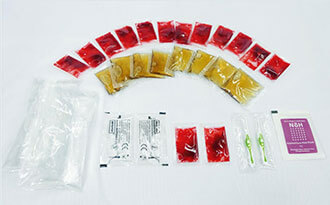MAP Packaging Equipment : Design, Gas Control & ROI
Modified Atmosphere Packaging (MAP) is an essential technology for preserving fresh meat, seafood, ready meals, and baked goods. By replacing ambient air with a nitrogen–carbon-dioxide mix, MAP suppresses microbial growth and oxidation, extending shelf life while maintaining flavour and appearance.
As competition tightens and consumer expectations grow, maximizing the efficiency of MAP sealing machines becomes vital. Whether you operate a small food business or a large-scale manufacturing plant, understanding what affects your MAP packaging machine's performance can lead to better quality control, reduced costs, and improved productivity.
Read more: The Benefits of Vacuum Skin Packaging

What Is Modified-Atmosphere Packaging (MAP)?
MAP replaces the air inside a food tray with a controlled mix of nitrogen, carbon-dioxide and—when required—oxygen.
Why it matters:
- Extends shelf life and cuts food waste
- Prevents products from crushing or sticking together
- Slashes preservative use
- Reduces the cost of re-shipping damaged goods
MAP Sealing Machine Design : How Build Quality Affects Performance
A MAP sealing machine's structural design and component quality directly influence its operational efficiency. Well-engineered machines offer higher precision in sealing and gas flushing. Poor build quality often results in frequent maintenance issues, misaligned seals, and inconsistent gas composition.
Modern tray sealing machines or vacuum-based MAP systems with modular or integrated designs offer more flexibility. Modular systems allow for easier upgrades and customization, while integrated models provide seamless operation across packaging, gas flushing, and sealing stages.

Atmosphere Control & Shelf-Life Impact
Gas Composition & Flow Accuracy
A key function of any modified atmosphere packaging machine is the replacement of oxygen in the package with a specific blend of gases, typically nitrogen (N₂), carbon dioxide (CO₂), and sometimes oxygen (O₂) depending on the product. Accuracy in flushing is essential: too little CO₂ may fail to inhibit microbial growth, while too much could affect texture or flavor.
Effect on Product Longevity
Efficient MAP sealing machines use precise sensors and gas flow controls to maintain consistent gas ratios. Inconsistent delivery can shorten shelf life, reduce product quality, or increase returns.
Seal Integrity and Heat Sealing Performance
Even if the correct gas mixture is used, a poor-quality seal can cause leaks that allow air to re-enter the package. Tray sealing equipment must maintain consistent temperature, pressure, and dwell time during the heat-sealing process to create airtight seals.
Many modern MAP sealing machines now come equipped with automatic seal detection and rejection systems. These systems use vision inspection or leak detection sensors to identify and remove defective packages from the production line, ensuring only top-quality products reach consumers.
Film and Tray Compatibility
Material Selection
The choice of film and tray plays a significant role in MAP performance. High-barrier films are essential to prevent gas exchange and maintain internal atmosphere. New trends include recyclable, compostable, and multi-layer films that balance sustainability with preservation.
Compatibility Issues
Low-quality films or trays can result in poor seals, leaks, or film memory that causes lifting post-sealing. MAP sealing machines should be calibrated based on the material properties to optimize output.
Automation and Control Systems
PLC and HMI Interfaces
Modern MAP packaging equipment integrates programmable logic controllers (PLCs) and human-machine interfaces (HMIs) for precise adjustments, real-time monitoring, and error detection. This reduces reliance on manual operation and boosts repeatability.
Recipe Management
Automated machines can store multiple product profiles or “recipes,” enabling quick adjustments when switching between products—essential for businesses handling a variety of SKUs or custom packaging formats.
Speed and Cycle Time
Machine Throughput
Faster packaging does not always mean better performance. Efficient MAP sealing machines balance speed with consistent flushing, sealing, and inspection. Dual-lane or multi-chamber systems can drastically improve productivity without compromising on quality.
Optimizing for Production Volume
For small and medium-sized enterprises (SMEs), semi-automatic machines may suffice, while larger facilities benefit from fully automatic modified atmosphere packaging equipment with high throughput.
Maintenance and Downtime
Preventive Maintenance
Consistent maintenance of MAP packaging machines prevents unscheduled downtime, maintains hygiene standards, and prolongs machine life. Many modern units offer predictive maintenance features using AI or IoT sensors.
Ease of Cleaning and Changeovers
Especially in meat and dairy applications, quick and effective cleaning systems are vital. Machines with tool-less changeovers and easy-to-remove components save time and reduce the risk of contamination.
Environmental and Operational Conditions
Ambient Temperature & Humidity
External conditions such as ambient temperature, humidity, and even altitude can influence the gas composition inside sealed packages. MAP packaging equipment must be able to adapt or be adjusted according to these environmental factors.
Operator Skill Level
Operators need proper training to manage settings, conduct inspections, and handle materials. Even the most advanced tray sealing machine will underperform if not operated correctly.
You can refer more about Y-Fang Group's products at Automatic Vacuum & M.A.P. Sealing Machine
Y-Fang MAP Packaging Equipment Line-up
To fully leverage the benefits of modified atmosphere packaging, selecting the right equipment is crucial. Y-Fang Group offers advanced MAP packaging solutions specifically designed to enhance efficiency, maintain high-quality seals, and ensure food safety and shelf life.
Automatic Vacuum & MAP Sealing Machine: ET-55
The ET-55 is a cutting-edge gas mixing continuous sealing machine engineered to enhance food packaging safety, hygiene, and operational efficiency. Featuring anodized anti-corrosion treatment on molds and Teflon-coated sealing heaters, the ET-55 prevents sticking and contamination. Its stainless steel frame guarantees durability and hygiene compliance. The user-friendly electronic touch screen combined with an advanced PLC control system simplifies operations. Key highlights include:
- Quick-change molds with width-adjustable guide rail—fits multiple tray widths without tool swaps.
- Digitally timed vacuum cycle; ≤ 0.1 % residual O₂ before gas back-fill.
- Dual MAP modes—straight gas flush (0.5–1 % O₂) or vacuum-plus-gas (0.1–0.3 % O₂) for oxygen-sensitive SKUs.
- Auto gas-mix valve optimises N₂ / CO₂ ratio per stored recipe.
- Optional in-line cutter delivers a clean retail edge.
The ET-55 model is ideal for businesses seeking efficient MAP sealing machines with superior flexibility and ease of maintenance.
Quick-Spec Snapshot

Automatic Continuous Vacuum Tray Sealing Machine: ET-600
Designed for durability and flexibility, Y-Fang’s ET600 continuous vacuum sealing machine provides exceptional sealing quality and safety. It utilizes anodized anti-corrosion molds and Teflon-coated sealing components to ensure consistent, clean seals. Constructed entirely from welded stainless steel, the ET600 delivers long-term durability and meets stringent hygiene standards. Its advanced features include:
- Electronic touch screen and PLC interface for ease of use.
- Replaceable upper and lower sealing molds for varied product compatibility.
- Servo belt drive integration to streamline connectivity with input and output equipment.
- All-welded stainless frame rated for wash-down zones.
- Dual MAP modes—straight gas flush (0.5–1 % O₂) or vacuum-plus-gas (0.1–0.3 % O₂) for highly oxygen-sensitive SKUs
The ET-600 is perfect for high-demand packaging environments requiring robust machinery with integrated automation capabilities.
Quick-Spec Snapshot

Vacuum Gas-Flush Semi-Auto Sealing Machine: VG-70
The VG-70 series bridges the gap between manual tray sealers and fully automatic lines. Using a Busch vacuum pump followed by a nitrogen/CO₂ back-flush, it achieves ≤ 0.1 % residual oxygen while keeping capital cost and floor footprint modest. A dual-station shuttle lets one tray set seal while the next is loaded, processors the output they need. It eliminates the cost of a complex infeed system. Stainless-steel construction, an impact-resistant acrylic guard, and a recipe-driven PLC/HMI bring the same food-safety and repeatability standards found on Y-Fang’s larger continuous machines.
Key highlights
- Semi-automatic shuttle design—operators load while the opposite station seals, keeping cycle time tight without full-auto cost.
- German-built Busch vacuum pump + gas-flush loop hold residual O₂ at ≤ 0.1 %.
- Dual MAP modes—straight gas flush (0.5–1 % O₂) or vacuum-plus-gas (0.1–0.3 % O₂) for ultra-fresh SKUs.
- Touch-screen HMI / PLC stores multiple product recipes and displays real-time fault codes.
- Tenon-lock quick-change molds—swap tray formats in < 3 min; extra interchangeable mold sets available for seasonal SKUs.
- Inside-cut tooling option leaves film flush to rim—no manual trimming needed.
- HACCP-grade stainless frame and easy-wash acrylic safety doors simplify sanitation.

MAP Packaging FAQ
Q: What gas blend should I use for pork chops versus shrimp?
A: Pork stays red with 60-70 % O₂ / 30-40 % CO₂. Shrimp last longer at 40 % CO₂ / 60 % N₂.
Q: When do I need vacuum-plus-gas instead of straight gas flush?
A: Use it for oxygen-sensitive SKUs—salads, sushi, diced avocado—because it drives residual O₂ to ≤ 0.1 %, though the cycle is slightly slower.
Choosing the Right MAP Packaging Equipment for Your Needs
Y-Fang Group’s innovative MAP sealing machines—the ET-55, ET-600, and VG-70—offer advanced features tailored to diverse production needs. By selecting equipment designed specifically for your operational requirements, you can achieve higher productivity, reduce downtime, and enhance product quality and safety.
Ready to upgrade your line? Talk to a Y-Fang MAP specialist today.




